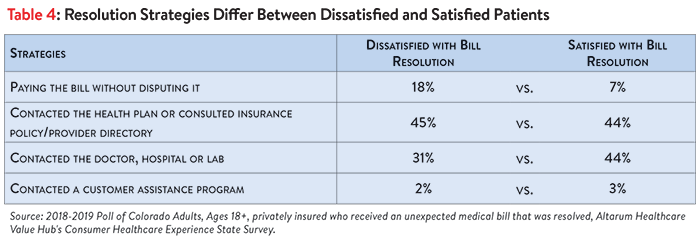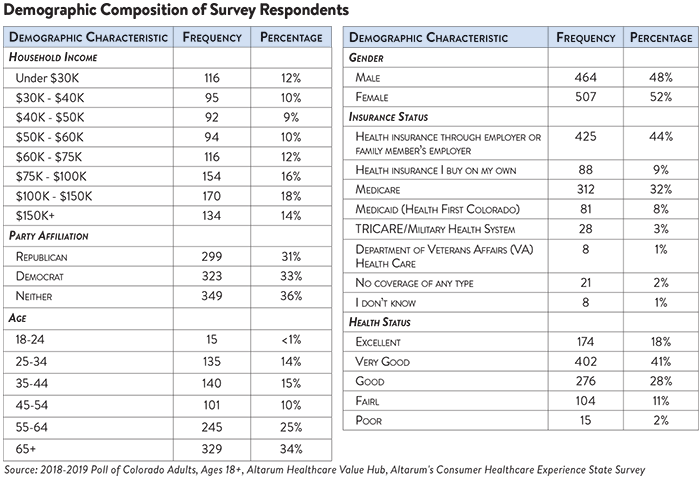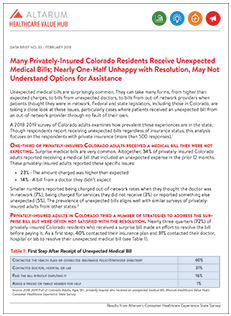Many Privately-Insured Colorado Residents Receive Unexpected Medical Bills; Nearly One-Half Unhappy with Resolution, May Not Understand Options for Assistance
Unexpected medical bills are surprisingly common. They can take many forms, from higher than expected charges, to bills from unexpected doctors, to bills from out-of-network providers when patients thought they were in-network. Federal and state legislators, including those in Colorado, are taking a close look at these issues, particularly cases where patients received an unexpected bill from an out-of-network provider through no fault of their own.
A 2018-2019 survey of Colorado adults examines how prevalent these experiences are in the state. Though respondents report receiving unexpected bills regardless of insurance status, this analysis focuses on the respondents with private insurance (more than 500 responses).1
One-third of privately-insured Colorado adults received a medical bill they were not expecting. Surprise medical bills are very common. Altogether, 34% of privately-insured Colorado adults reported receiving a medical bill that included an unexpected expense in the prior 12 months. These privately-insured adults reported these specific issues:
- 23%—The amount charged was higher than expected
- 14%—A bill from a doctor they didn’t expect
Smaller numbers reported being charged out-of-network rates when they thought the doctor was in-network (7%); being charged for services they did not receive (3%) or reported something else unexpected (5%). The prevalence of unexpected bills aligns well with similar surveys of privately-insured adults from other states.2
Privately-insured adults in Colorado tried a number of strategies to address the surprise bill but were often not satisfied with the resolution. Nearly three-quarters (72%) of privately-insured Colorado residents who received a surprise bill made an effort to resolve the bill before paying it. As a first step, 40% contacted their insurance plan and 31% contacted their doctor, hospital or lab to resolve their unexpected medical bill (see Table 1).

Just 18% of privately insured Colorado adults who experienced a surprise bill took more than one step to resolve the unexpected bill. Almost no respondents reported any of these courses of action:
- Contacting an insurance broker
- Filing an insurance appeal
- Contacting a consumer assistance program
- Contacting a state government agency
- Contacting state legislators or member of Congress
- Contacting a lawyer
- Filing a formal complaint
Among privately-insured Colorado adults with an unexpected medical bill in the past 12 months, most (65%) paid the bill in full or through a payment plan. A minority were able to negotiate a lower bill or have their bill dismissed (21%) while 4% of privately insured respondents indicated their unexpected medical bill was sent to collections and remains unpaid (see Table 2).

Nearly one-half of unexpected medical bills were not resolved satisfactorily; many remain unresolved.
Among privately-insured Colorado adults who had an unexpected medical bill, just over one-quarter indicated that the issue was resolved to their satisfaction. Almost one-half indicated that the issue was not resolved to their satisfaction. For another 21%, they don’t consider the issue resolved (see Table 3).

Both satisfied and dissatisfied consumers reported attempting to contact the health plan or consulted their insurance policy or provider directory in equal amounts when they received their unexpected bill. Additionally, both satisfied and dissatisfied consumers were likely to have tried additional strategies such as contacting a customer assistance program. However, dissatisfied consumers reported less attempts to contact the doctor, hospital or lab after receipt of an unexpected bill compared to satisfied consumers and more often paid the bill without disputing it (see Table 4).

Perhaps not surprisingly, consumers satisfied with how their medical bill was resolved were more likely to have either negotiated a lower payment or had their bill written off or dismissed (see Table 5).

Discussion
Privately-insured Colorado adults receive unexpected medical bills in high numbers. The nature of these bills takes many forms, from higher than expected charges, to bills from doctors they didn’t expect, to surprise out-of-network bills. Distressingly, nearly one-half of these unexpected bills are not resolved to the satisfaction of the recipient. These Colorado findings are consistent with other national survey data showing unacceptably high rates of unexpected medical bills.
Data showing that survey respondents made only modest efforts to resolve their bill—and that many remain unsatisfied—are consistent with other survey data showing that consumers have a poor understanding of how to navigate the healthcare system. Consumers may not know they have the right to appeal a coverage decision, how to seek help from state regulators or how to navigate hospital charity care policies.3
As states address the issue of surprise medical bills related to out-of-network care, they are emphasizing the need to get the consumer out of the middle—strategies such as better consumer notices and prohibiting balance billing by providers in certain circumstances. When balance billing is prohibited, these consumer protections must be accompanied by a mechanism to resolve the out-of-network provider’s bill.
Other efforts states are undertaking include simplifying health plan benefit designs4 and improving the accuracy of provider directories and adequacy of provider networks. In light of poll results showing that few bill recipients take more than one step to resolve their bill, Colorado policy makers may also want to consider creating a dedicated state ombudsman’s office to help consumers with their billing problems, such as available in Connecticut and Vermont.5
Notes
1. These privately-insured respondents include those covered by plans regulated at the state level (“fully insured” plans), as well as plans regulated by the U.S. Department of Labor (ERISA or “self-insured” plans). The later are typically the plans offered by larger employers.
2. A Consumer Reports survey finds nearly one third of privately insured Americans hit with surprise medical bills, Consumer Reports (August 2018). https://www.consumerreports.org/medical-billing/sick-of-confusing-medical-bills/ In addition, a Kaiser Family Foundation survey finds that among insured, non-elderly adults struggling with medical bill problems, charges from out-of-network providers were a contributing factor about one-third of the time. A study by Yale University found 22% of visits to emergency departments resulted in surprise medical bills.
3. A 2014 Kaiser Family Foundation survey found one-third of respondents did not know that if a health plan refuses to pay for a medically recommended service, an insured person has the right to appeal the plan’s decision. https://www.kff.org/health-reform/poll-finding/assessing-americans-familiarity-with-health-insurance-terms-and-concepts/. A separate 2015 survey found three-quarters of privately insured adults are unsure if they have the further right to appeal to the state/an independent medical expert if their health plan refuses coverage for medical services they think they need. Few (just 13%) could identify the state agency/department tasked with handling health insurance complaints. https://consumersunion.org/research/surprise-bills-survey/
4. For examples, see Corlette, et al., Missed Opportunities: State-Based Marketplaces Fail to Meet Stated Policy Goals of Standardized Benefit Designs, Urban Institute (July 2016).
5. Hunt, Amanda, The Office of the Healthcare Advocate: Giving Consumers a Seat at the Table, Research Brief No. 25, Healthcare Value Hub (May 2018).
Methodology
Altarum’s Consumer Healthcare Experience State Survey (CHESS) is designed to elicit respondents’ unbiased views on a wide range of health system issues, including confidence using the health system, financial burden, and views on fixes that might be needed.
The survey used a web panel from SSI Research Now containing a demographically balanced sample of approximately 1,000 respondents who live in Colorado. The survey was conducted only in English and restricted to adults ages 18 and older. Respondents who finished the survey in less than half the median time were excluded from the final sample, leaving 971 cases for analysis with sample balancing occurring in age, gender and income to be demographically representative of Colorado. After those exclusions, the demographic composition of respondents is as follows.








